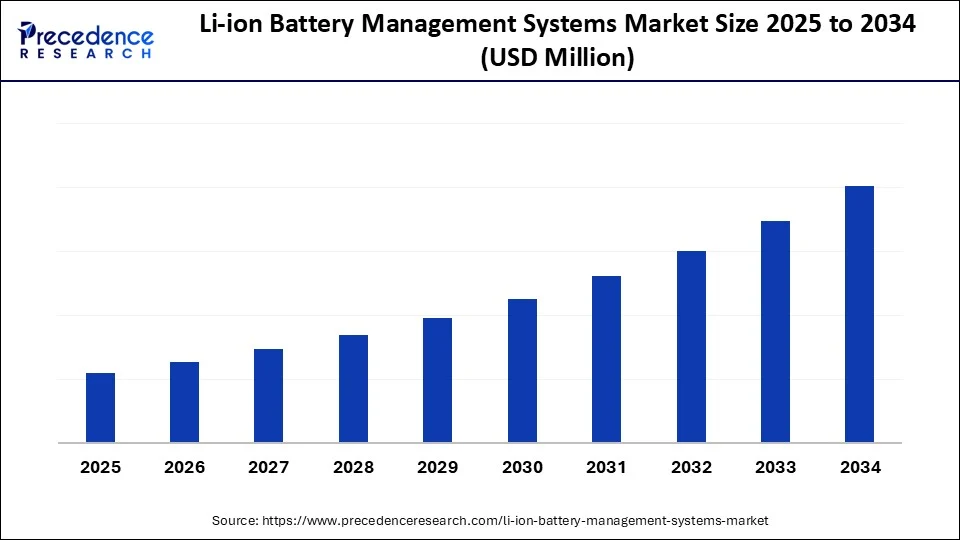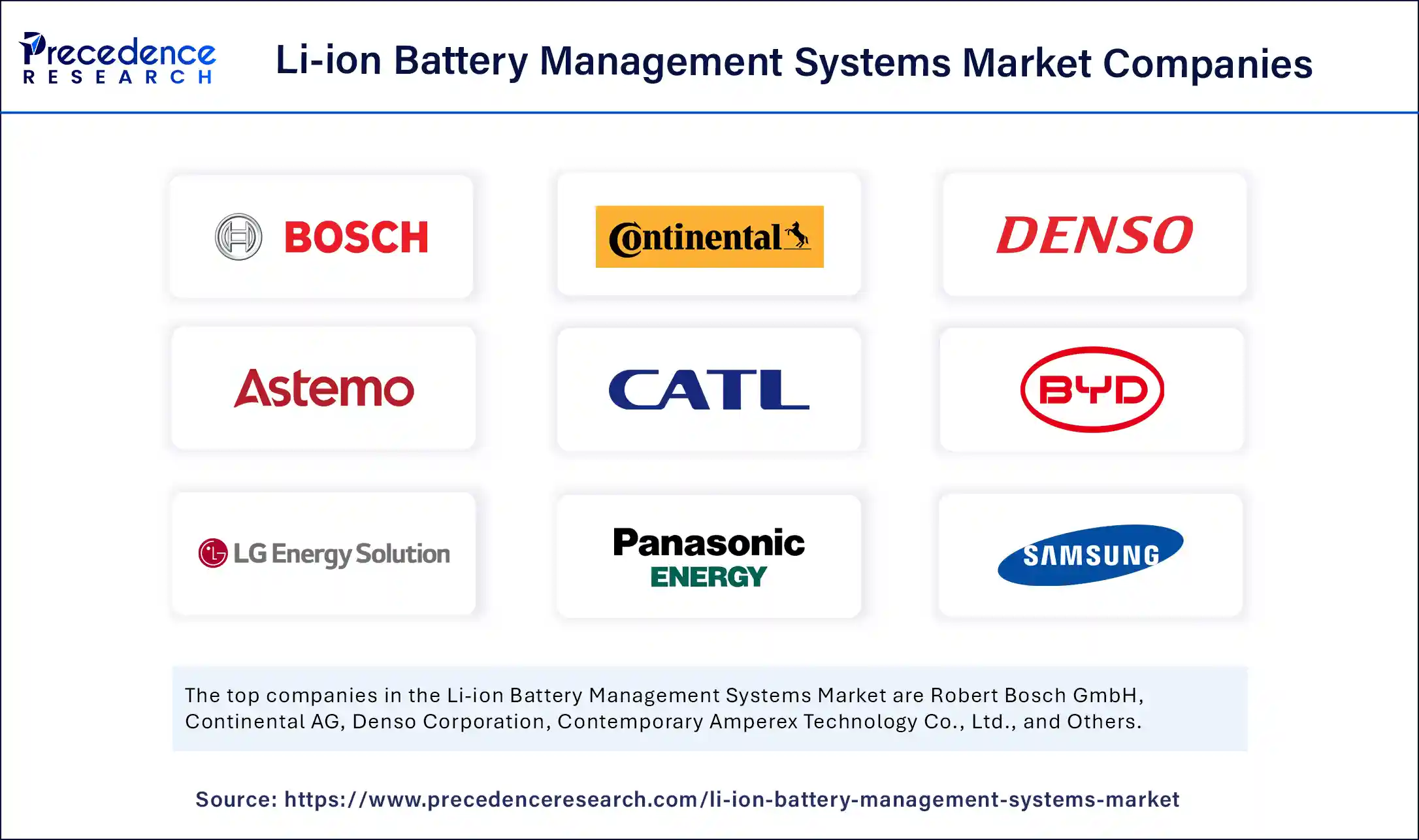The global Li-ion battery management systems (BMS) market is poised for robust growth from 2025 to 2034, driven by increasing electric vehicle (EV) adoption, integration of renewable energy sources, and rising safety concerns around lithium-ion battery usage. These systems, critical for monitoring, balancing, and protecting lithium-ion battery packs, are becoming essential components across mobility, stationary storage, and industrial applications. With innovations such as AI-driven analytics optimizing battery life and performance, the industry is expected to witness revolutionary advances that will propel market valuation substantially over the forecast period.

Quick Insights
-
Market Base Year: 2024
-
Forecast Period: 2025 to 2034
-
Dominant Region: Asia Pacific
-
Fastest Growing Region: North America
-
Key Segments: Topology (Modular, Distributed), Components (Hardware, Software & Analytics), Applications (Automotive, Stationary Storage, Industrial)
-
Leading Companies: BYD, Tesla, General Motors, Others
-
Global EV Production in 2024: 17.3 million electric cars, with China accounting for 70%+ of production
-
India’s Energy Storage Investment: Estimated ₹4.79 lakh crore by 2032
Get a Sample: https://www.precedenceresearch.com/sample/6706
Market Revenue and Segment Overview
| Segment | Market Share / Revenue Details (2024) | Growth Forecast (2025-2034) |
|---|---|---|
| Topology: | ||
| Modular | Market leader due to EV and ESS use | Slower yet steady growth expected |
| Distributed | Rapid growth due to scalability | Projected significant CAGR |
| Component: | ||
| Hardware | Largest share driven by essential sensors and control units | Dominant, evolving with tech advances |
| Software & Analytics | Emerging segment with AI/ML integration | High CAGR anticipated |
| Application: | ||
| Automotive Passenger BEVs | Largest share among applications | Sustained growth from EV market demand |
| Stationary Storage | Growing with renewable energy storage | Attractive growth due to grid modernization |
| Sales Channel: | ||
| OEM | Dominates with direct integration | Dominant sales channel, expanding reach |
| Aftermarket/Retrofit | Growing with fleet electrification | Increasingly important for cost efficiency |
What’s Powering Market Growth?
How Is the Rising Demand for Electric Vehicles (EVs) Impacting Growth?
The surging global adoption of EVs is the prime catalyst for the Li-ion BMS market expansion. EVs rely heavily on lithium-ion batteries, which require sophisticated battery management to ensure safety, longevity, and efficiency. BMS technologies monitor critical parameters such as voltage, current, temperature, and state of charge (SOC) to prevent hazards like overcharging, overheating, and deep discharge. The recent production of 17.3 million electric cars globally in 2024, led by China’s dominance, highlights the accelerating demand for dependable BMS solutions designed for the automotive EV sector.
What Role Does Renewable Energy Storage Play?
Renewable energy sources like solar and wind generate intermittent power, creating a crucial need for efficient energy storage systems (ESS). Li-ion BMS manages large battery packs within these ESS to provide grid stability, optimize battery performance, and ensure safety. Government incentives globally, especially in countries like India and China, are fueling investment into renewable projects and energy storage infrastructure, significantly boosting the demand for robust battery management technologies. For example, India plans to add over 47 GW of battery storage capacity by 2032 with investments nearing ₹3.5 lakh crore, positioning itself as a future leader in energy storage solutions.
Emerging Trends and Opportunities
Can AI and Modular Designs Revolutionize Battery Management?
Artificial intelligence (AI) integration is transforming BMS capabilities by enabling predictive analytics, real-time condition monitoring, and enhanced diagnostics that improve battery life and safety. AI algorithms analyze data from battery cells continuously, predicting potential failures and allowing proactive maintenance, thus reducing downtime. Modular BMS architectures offer scalability, ease of maintenance, and improved reliability for large and complex battery arrays, making them the current market leaders. On the other hand, distributed BMS is gaining traction for its superior flexibility and safety, particularly in high-capacity applications like EVs and large-scale ESS.
Expert Viewpoint
“The Li-ion battery management systems market is entering an exciting phase marked by intelligent, AI-driven technologies that not only enhance battery safety and efficiency but also allow for scalable solutions across various industries. Regulatory pressures combined with technological innovation are creating a dynamic environment conducive to growth across regions, notably in Asia-Pacific and North America.”
— Dr. Sanjay Mehta, Principal Consultant, Precedence Research
Regional and Segment Analysis
Which Regions Are Leading the Charge?
Asia Pacific dominates the Li-ion BMS market due to its vast manufacturing base for batteries and EVs, strong governmental support for renewable energy, and growing domestic consumption. Countries like China, India, Japan, South Korea, and Singapore are investing heavily in renewable energy projects and tightening emission standards, thereby propelling the market growth.
North America, while smaller in market size compared to Asia Pacific, is the fastest-growing region. Growth is driven by innovation hubs, high EV adoption rates, increased investments in renewable energy, and governmental incentives promoting clean technologies. Europe also contributes steadily with policies favoring EVs and renewable integration.
Which Segments Are Poised for Expansion?
-
Topology: Modular systems currently lead, favored in EVs and energy storage for their robust and scalable design. Distributed systems are expected to grow rapidly due to their adaptability and safety features.
-
Components: Hardware holds the major market share, essential for battery monitoring, but software and analytics integrated with machine learning and AI show substantial growth potential.
-
Applications: Automotive passenger battery electric vehicles (BEVs) command the largest share as EV adoption escalates. Stationary storage systems present a rising opportunity amid efforts to modernize power grids and incorporate renewables.
Innovations and Breakthroughs
Leading players such as Tesla, BYD, and General Motors are actively developing advanced BMS technologies featuring wireless communication, enhanced sensor technology, and modular designs. These innovations improve battery pack monitoring, thermal management, and overall performance, helping extend battery life and reduce safety risks.
Read Also: Co-Packaged Optics (CPO) Market Set to Surge Past USD 1,055.11 Mn by 2034
Challenges and Cost Pressures
Despite promising growth, market expansion faces challenges, primarily due to high implementation costs associated with sophisticated sensors and monitoring systems. Large-scale deployments, especially in EVs and renewable-related storage, require significant upfront investment, potentially limiting adoption in price-sensitive regions. Additionally, ensuring reliability while integrating new AI-driven functionalities demands continued research and development efforts.
Case Study: India’s Battery Energy Storage Surge
India exemplifies a high-growth market for Li-ion BMS fueled by government initiatives to expand energy storage capacity. With plans to add 47 GW of battery storage by 2032 and ongoing investments exceeding ₹4.79 lakh crore, India is rapidly establishing itself as a pivotal player in the global clean energy transition. The government’s launch of Battery Energy Storage Systems (BESS) manufacturing facilities underlines the country’s commitment to enhancing grid resilience and sustainable power solutions.
Li-Ion Battery Management Systems Market Companies

- Robert Bosch GmbH
- Continental AG
- Denso Corporation
- Hitachi Astemo, Ltd.
- Contemporary Amperex Technology Co., Ltd.
- BYD Company Limited
- LG Energy Solution
- Panasonic Energy Co., Ltd.
- Samsung SDI Co., Ltd.
- Sensata Technologies
- Nuvation Energy
- Eberspächer
- Ewert Energy Systems
- Elithion, Inc.
- LION Smart GmbH
- Marelli
- Aptiv PLC
- Shenzhen Jiabaida (JBD)
- Daly Electronics Co., Ltd.
- Hangzhou Bestech Power Co., Ltd.
About Precedence Research
Precedence Research is a leading market intelligence firm dedicated to delivering in-depth, data-driven research reports across diverse industries. Our expert consultants combine rigorous analysis with advanced research methodologies to provide actionable intelligence that helps businesses and investors make informed decisions globally. For inquiries, customization requests, or bulk purchases, contact us at sales@precedenceresearch.com.